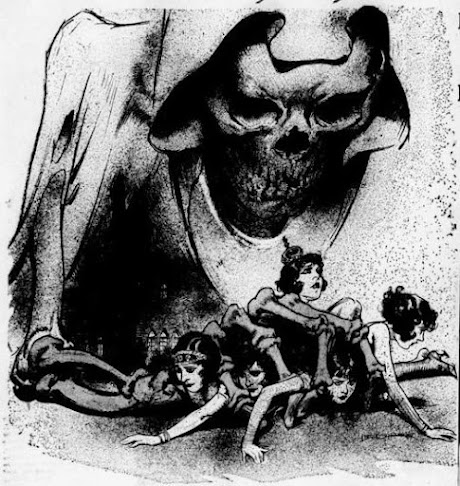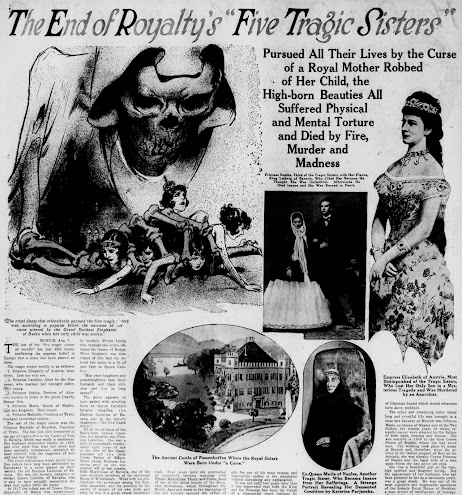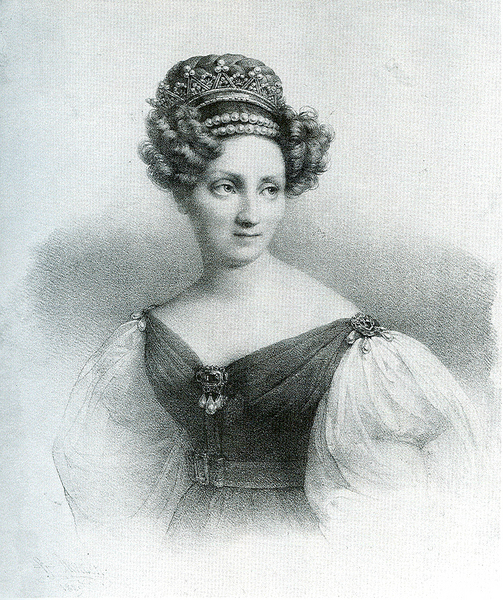Je découvre dans un journal américain une prétendue malédíction qu'aurait prononcée Stéphanie de Beauharnais, grande-duchesse de Bade, contre la descendance Wittelsbach. Je n'en ai trouvé mention que dans ce journal, une première pour moi . En aviez-vous connaissance ? Grand merci de partager vos informations si c'est le cas !
Did the curse pronounced by Stephanie de Beauharnais, Grand Duchess of Baden, bring about the downfall of the House of Wittelsbach?
Source : San Antonio light., October 11, 1925, Page 8
" The cruel misfortunes which befell these five sisters have long been attributed by Europeans to a curse placed on their mother, the old Duchess Ludovica of Bavaria. She was the favorite daughter of wicked Queen Caroline of Bavaria, who is said to have actually committed the deed that called forth the curse.
In 1817 the infant son of Crown Prince Alexander of Baden was mysteriously stolen from his cradle, as many historica Works state. He was the only child of the Grand Duke Charles of Baden and his French wife Stephanie, the adopted daughter of the great Napoleon and the Empress Josephine. One fine Spring day—it was May 8— the little Crown Prince, in care of a trusted nurse, was taking the air in his cradle on the terrace of the great palace at Carlsruhe. During a momentary absence of the nurse, the child, who was in the best of health, was stolen, and in his place on the pillows was found a dying infant of the same age, his face disfigured and unrecognizable through some terrible eruption. The substituted child was quietly buried, the grief-stricken Grand Dushess refusing to recognize it as her own.
The loss of the little Crown Prince made his uncle, Prince Louis, heir to the throne of Baden. The year following the kidnapping the father of the lost Prince, who was an invalid, died, and his brother Louis duly inherited the throne. Investigations started by the widowed Grand Duchess Stephanie then convinced her that Queen Louise of Bavaria had engineered the conspiracy to steal the little Crown Prince for the benefit of her favorite brother, Prince Louis, who, through this crime, obtained the throne of Baden. When Stephanie was convinced of this fact she uttered this curse in a fit of mad fury to Queen Caroline:
“May your daughters and granddaughters lose their husbands and their children and live in long agony!”
The curse appears to have passed with crushing force to Queen Carolin's favorite daughter, the Duchess Ludovica of Bavaria and to the latter’s daughters—“the five tragic sisters.” Of all the children of the
Baden-bom Queen Caroline, her favorite was Princess Ludovica. She was a child of remarkable beauty,
about eight years of age at the time of the disappearance of the little Crown Prince of Baden.
When young Princess Ludovica grew up she was married off to her cousin, Duke Maximilian of Bavaria, one of the most eccentric members of the sovereign House of Wittelsbach. [...]
Traduction
Les malheurs cruels qui ont frappé ces cinq sœurs [Wittelsbach] ont longtemps été attribués par les Européens à une malédiction jetée sur leur mère, la vieille duchesse Ludovica de Bavière. Elle était la fille préférée de la méchante reine Caroline de Bavière, qui aurait commis l'acte à l'origine de la malédiction.
En 1817, le fils du prince héritier Alexandre de Bade a été mystérieusement enlevé de son berceau, comme l'affirment de nombreux ouvrages historiques. Il était l'unique enfant du grand-duc Charles de Bade et de son épouse française Stéphanie, fille adoptive du grand Napoléon et de l'impératrice Joséphine. Par un beau jour de printemps - c'était le 8 mai - le petit prince héritier, confié à une nourrice de confiance, prenait l'air dans son berceau sur la terrasse du grand palais de Carlsruhe. Pendant une absence momentanée de la nourrice, l'enfant, qui était en pleine santé, a été volé et, à sa place sur les oreillers, on a trouvé un nourrisson mourant du même âge, au visage défiguré et méconnaissable à cause d'une terrible éruption cutanée. L'enfant ainsi remplacé fut enterré discrètement, la Grande-Duchesse, accablée de chagrin, refusant de le reconnaître comme le sien.
La perte du petit prince héritier a fait de son oncle, le prince Louis, l'héritier du trône de Bade. L'année suivant l'enlèvement, le père du prince disparu, invalide, décède et son frère Louis hérite du trône. L'enquête menée par la grande-duchesse veuve Stéphanie la convainc alors que la reine Louise de Bavière a fomenté le complot visant à voler le petit prince héritier au profit de son frère préféré, le prince Louis, qui, par ce crime, a obtenu le trône de Bade. Lorsque Stéphanie fut convaincue de ce fait, elle lança cette malédiction à la reine Caroline dans un accès de fureur folle :
"Que vos filles et petites-filles perdent leurs maris et leurs enfants et vivent une longue agonie !
La malédiction semble avoir été transmise avec une force écrasante à la fille préférée de la reine Caroline, la duchesse Ludovica de Bavière, et aux filles de cette dernière, "les cinq sœurs tragiques". De tous les enfants de la reine Caroline
de la reine Caroline, sa préférée était la princesse Ludovica. C'était une enfant d'une beauté remarquable, qui était âgée d'environ huit ans au moment de la disparition du petit prince héritier de Bade.
Une fois adulte, la jeune princesse Ludovica fut mariée à son cousin, le duc Maximilien de Bavière, l'un des membres les plus excentriques de la maison souveraine de Wittelsbach. [...]







Aucun commentaire:
Enregistrer un commentaire